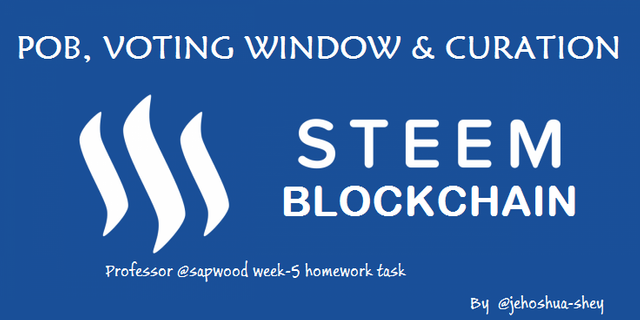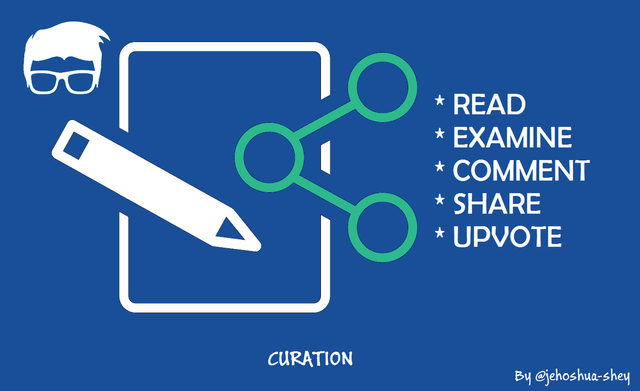HOMEWORK TASK 5
INSTITUTION: STEEMIT CRYPTO ACADEMY
COURSE: Steem Blockchain (PoB, Voting Window, Curation) - Week 5
CRYPTO PROFESSOR: SAPWOOD
INTRODUCTION

Over the years cryptocurrency and blockchain have existed, there have been numerous creations with quite intresting features. One of such creations is the steem blockchain. The steem blockchain has a unique feature which is, it rewards content. This feature makes the blockchain quite interesting. One might begin to wonder how possible that is? Answer is, it's very possible.
Steem blockchain has an interesting consensus mechanism called Proof-of-Brain. This is what enables the blockchain to reward content, rewarding both the content creator and the curators. This consensus mechanism goes ahead to also reward the blockchain's witnesses, vested token holders, and DAO.
In this post, I'll be elaborating on this consensus mechanism and how it rewards content, both the content creator and curator.
WHAT IS Proof-of-Brain (POB)

Proof-of-brain is a blockchain consensus mechanism that assesses the social quality of a content. Like was mentioned in the course notes for this course, this mechanism utilizes the wisdom of the people using the blockchain, to determine the social value of a content.
Furthermore, this mechanism, as was also stated in the course notes, has a reward pool from which it rewards the creators of the content and the efforts of those whose wisdom is used to determine the social quality of the content. These set of persons are referred to as curators.
The activities of the content curators are very important as they are how the blockchain, through Proof-of-Brain consensus mechanism, rewards content. These activities are referred to as curation. The rest of this post elaborates on what curation is and how it works.
WHAT IS CURATION

When a curator comes across a created content eg. a post, they read it, then they cross-examine it to determine the quality of the post, if it was plagiarized or spammed or not. If they think that the quality is okay, they can leave engaging comments on the post and also resteem and/or share the post to enable it reach more people. To complete the action of curation, the curator upvotes the post with their available voting resources.
The voting resources employed in curation include the curator's current vote weight, their current voting power, and their current effective steem power. This act of voting, though not the only activity in curating, is very important. This implies that, knowing how it works is very important too.
Voting can have different effects on a post depending on the time it was done after the post had been created. This leads us to a concept called voting window.
VOTING WINDOW.

Voting window is a time period created for voting on a post. On the steemit platform, it lasts for 7 days. The effect of voting as I've learned from the course notes for this course, varies within the seven day period. The essence of this, I believe, is to encourage diligent efforts on the part of the curators. Let me explain the different periods within this 7-day voting window.
REVERSE AUCTION PERIOD
Since curators get rewarded for upvoting a post, there's a possibility that they might just want to upvote any post they come across so as to get those rewards and since the early birds get the biggest chunk on the Proof-of-Brain mechanism, there will definitely be a rush to upvote posts as soon as they are posted. To prevent this, Proof-of-Brain began the 7-day voting window with the Reverse Auction Period - call it 'RAP' if you like.
This Reverse Auction Period lasts for the first 5 mins of the post. During this period, some curation rewards will be forfeited to the reward pool if a curator upvotes the post. Consider the table below
| Time | %reward | %reward forfeited |
|---|---|---|
| 1 min | 20% | 80% |
| 2 mins | 40% | 60% |
| 3 mins | 60% | 40% |
| 4 mins | 80% | 20% |
| 5 mins | 100% | 0% |
So the earlier the curator votes, the less reward they lose to the reward pool.
GENERAL VOTING WINDOW
This period runs from the 5th min to the 6th day and 12th hour of the post. During this period, no reward is lost to the reward pool. It is worthy of note, however, that this general voting window is by no means the best option for the curators. Some curators vote during the first period on posts that have more quality and would attract more curators.
DEPLETION PERIOD
'Depletion period' is a name I conned out for the last period of the 7-day voting window. During this period, the curator's upvote value depletes as the time increases.
Now, to the first question of this homework task -
(1) What will happen if you vote before "5 mins age of a post" & after "6 days 12 hrs age of post" in Steem Blockchain? (Include your own experiences/Examples)
From what I have said earlier if you vote before the 5th min of the age of the post, you will lose or forfeit some rewards to the reward pool. The amount lost or forfeited depends on the time it was voted, the later the lesser.
For personal experiences, consider this post curated by me in the image below -

Since I curated it after 1 min 28 secs, I definitely forfeit some rewards to the reward pool. Technically, I voted in the second minute as 1 min had already elapsed. From the table I provided when talking about Reversed Auction Period, I would be getting only 40% of the rewards and forfeiting 60% because I voted in the second week.
Also, after 6 days 12 hours, upvote value begins to deplete. The upvote value reduces as the time passes.
Here's the next homework task question -
(2) How do I check how much reward of a post has returned to the reward pool in Steem Blockchain? Include screenshots (Hint- Steemworld.org)
To check how much of the rewards of a post returned to the reward pool, we can use a stem tool like steemworld.org. To do this, you'll need to access the steemw.org page of the author of the post you want to check. Let me use my post as an example,
- I opened steemworld.org/@jehoshua-shey and hovered to one of my active posts
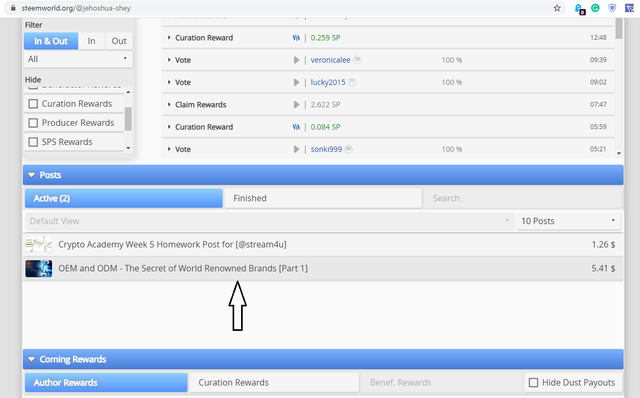
- Next, I click on the active post and some information drops down, including the rewards forfeited to the reward pool. From the image below, it is visible that 0.10% or ~ $0.006 was returned to the reward pool.
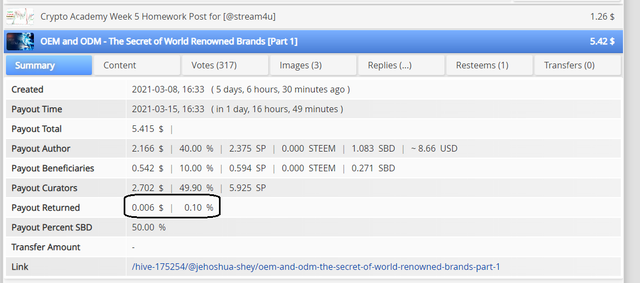
So far, we've talked about the effect of voting time on the curation rewards. Now, there's another important factor taught in the course that I have to mention. This is the voting position of the curator.
VOTING POSITION

This is also timing but this time, relative timing. It's a matter of who gets to the post first. When a post pays out, the first curators to vote usually get a higher % reward than those who curated later. The % reward you'll get depends on your curation position and the post payout. It increases as post payout increases.
Take a look at the reward sharing formula given in the course notes -
The image above is very much mathematical jargon but this is what it simply means -
Subtract the square root of the post payout before curation from the square root of the post payout after curation - (√P1 - √P0)
Multiply your answer by the square root of the total post payout - (√PT) x (√P1 - √P0)
Next, if the voting time is less than 5 min, divide the time by 5 - (t/5) to get your result for this step. If the voting time is greater than or equal to 5, use the value of 1 as your result for this step.
Multiply the results of steps 2 and 3
Half of the value of the result of step 4 is the payout a curator will get.
Let me take a real example. Consider this achievement 4 post below
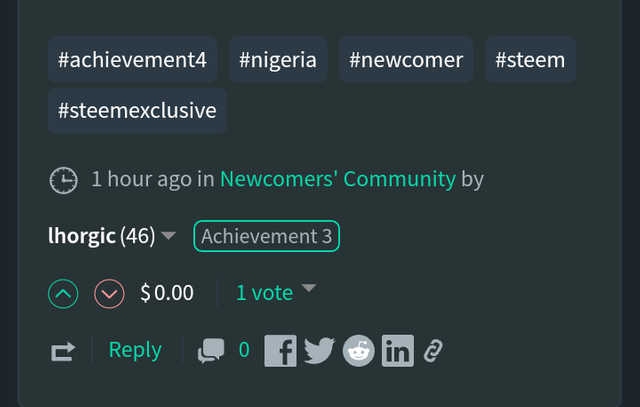
It has been voted by someone but the payout is still $0. Then I curated it and this was the result
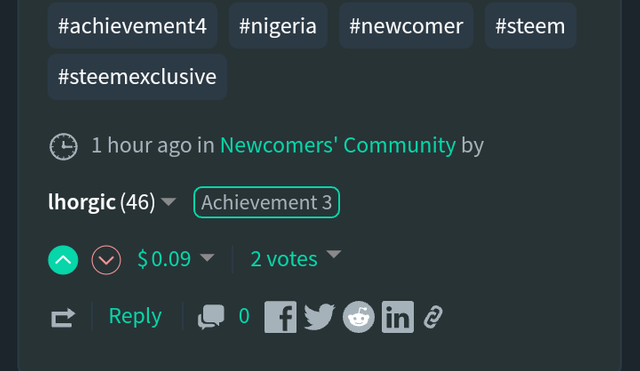
The post payout has increased after I curated it, to $0.09. This post payout includes TRX. The steem/SBD payout is actually $0.08 as can be seen on Steemworld
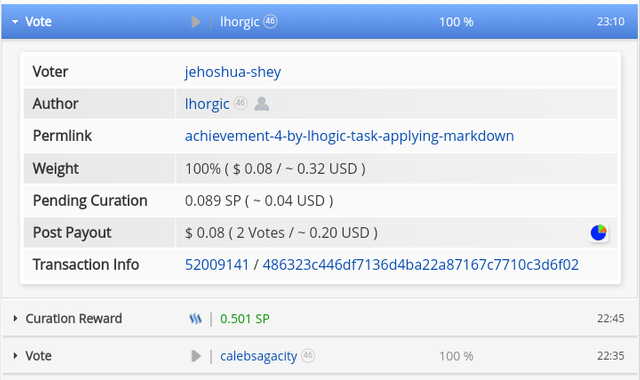
Now, let's gather our figures -
PT = $0.08
P1 = $0.08
P0 = $0
Since I voted the post after 5 mins,
∆t = 1
Recall the formula -
Pcurator (me) = 1/2 x (√PT) x (√P1 - √P0) x ∆t
Inputting the respective values,
Pcurator (me) = 1/2 x √$0.8 x (√$0.8 - √$0) x 1 = $0.04
So therefore, my pending curation reward is - $0.04
This leads to the next homework task question -
(3) Under what circumstances a curator can earn more than 100% upvote value as curation rewards?
The answer is straightforward. If the curator is the first to upvote the post or the first to upvote with a significant upvote value and the post payout is at least more than 4x the curator's upvote value, the curator will earn more than 100% of their upvote value as curation rewards.
Also, if a curator votes before a whale or if subsequent curators voting on the same post have a higher voting value, the curator could earn 100% or more of their upvote value
Now, the fourth task for this homework task -
(4) Pick any random post you have voted in Steem Blockchain and indicate the time and position of your voting, what is the projected curation reward? (Include relevant Screenshots) (Hint- Steemworld.org)
Here is an achievement 1 post of one of my recruits which I voted on Mar 12, 2021 -

As you can see, I voted the post after 38 mins 42 secs.
Now, here's my position on the curators list as at the time of filing this task -
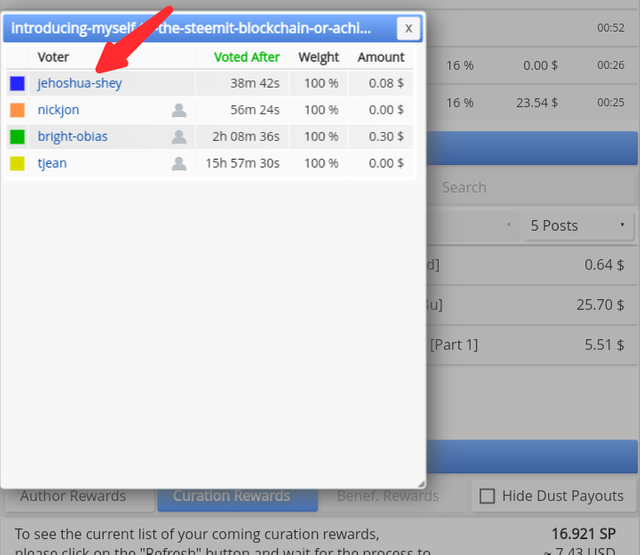
I was the first to upvote this post. Subsequently, a curator with a higher upvote value voted on the post. My upvote value is $0.08 and my projected payout is 0.092SP.
Now, I would kindly solicit your support for my friend @ebukalevi who is just joining the platform. If you wouldn't mind, could you please visit his post and curate?
Remember what curation means. Thanks.
For the last task of this homework task,
(5) What is the role of curation in better content discovery in Steem Blockchain?
Curation plays an integral role in content discovery. Where you have more curators who curate properly, you will definitely have better content discovery. In this case, the best contents will be getting the best rewards. This will positively impact the platform as there will be increased and improved interactions among people on the platform.
CONCLUSION

Proof-of-Brain is a very important mechanism that facilitates the rewarding of content creation and curation. It is well structured to support proper curation and not just upvoting. This concept, though seemingly advanced, ought to be understood by the people on this platform as it will help us become better curators.
In Proof-of-Brain, curation payout is determined by curation time, position, if a large upvote comes before or after and total post payout. These four are key to maximising curation rewards.
Personally, after learning this course I'll begin to make extensive adjustments to my curation pattern.
Thanks for reading.

Cc:
@steemcurator01
@steemcurator02
@steemcurator04
@steemitblog
@sapwood

